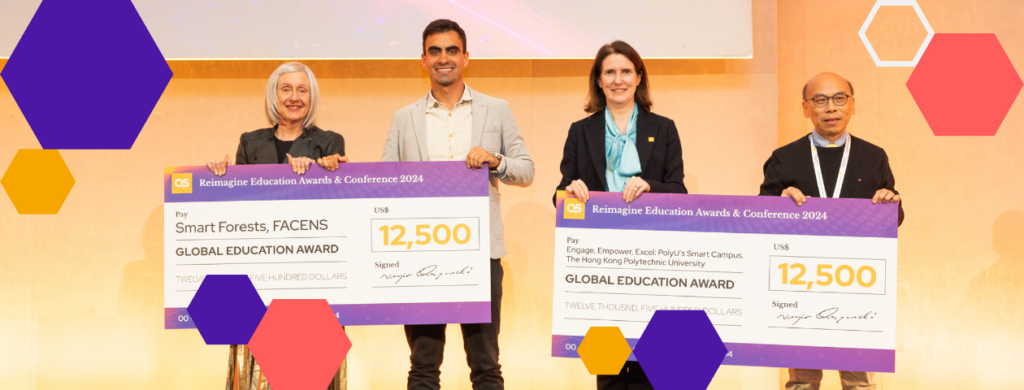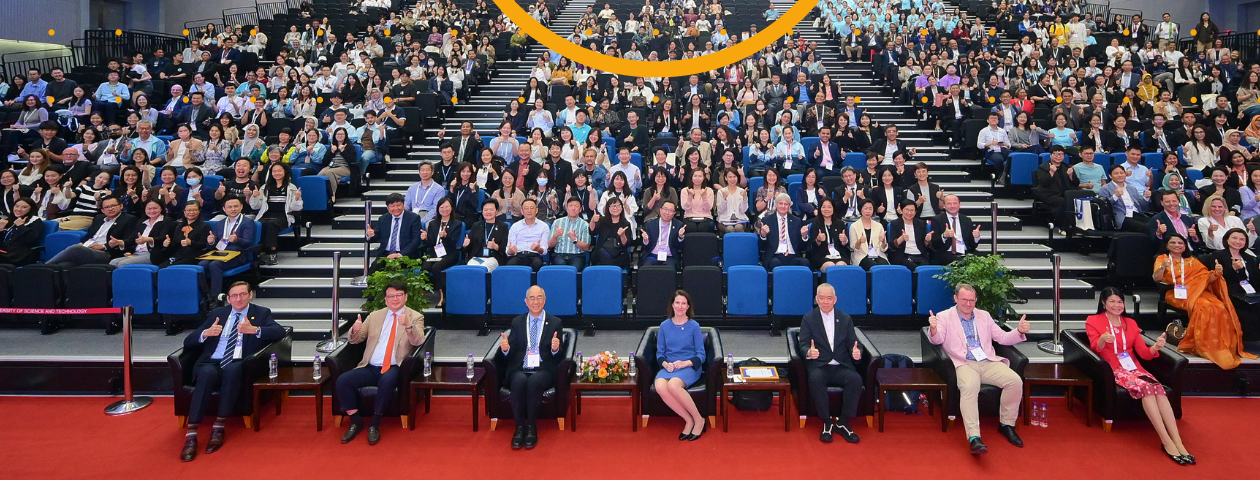
2024 is drawing to a close. 12 QS Summits, countless constructive consulting sessions, over 100,000 students enrolled at our university partners, and threeacquisitions – it’s been another busy year.
Alongside all of that, we’ve also shared insights across QS.com and QS Insights Magazine – well over 150 articles across the two outlets. While you may have missed some, there’s no need to worry. We’ve compiled our key moments and best insights from 2024.
QS welcomed HolonIQ and 1Mentor
In October, we acquired HolonIQ, one of the world’s leading providers of education intelligence and market insights. At the time, Jessica Turner, QS CEO, said: “By joining forces with HolonIQ, we are further strengthening our capacity to provide the critical data and insights that empower our clients to thrive in a rapidly evolving world. Together, we will drive innovation as a trusted partner to the global education community, staying true to our mission to empower a billion future learners to fulfil their potential.”
Earlier in 2024, we also acquired employability experts 1Mentor to help bridge the skills gap. In February, QS President Nunzio Quacquarelli said: “1Mentor seamlessly aligns with QS’ core mission of empowering learners globally to fulfil their potential through educational achievement, international mobility, and career development.”
Exploring student preferences and motivations
In our suite of reports based on the QS International Student Survey 2024, we discuss the preferences and motivations of students looking to study in major destination markets, and also what students from specific countries think is important. Whether you’re looking to diversify your recruitment, and make a more efficient recruitment strategy, you can use our reports for actionable insights.
Universities need to improve career support for international students
In the International Graduate Outcomes 2024 report, published in collaboration with Universities UK International, we explored the paths international graduates take from UK universities. We found that 73% of surveyed graduates were satisfied with the Graduate route visa, and international graduates add value to sectors that are vital to the UK economy; however, 53% of graduates felt that more could be done at universities to support career development and professional placements.
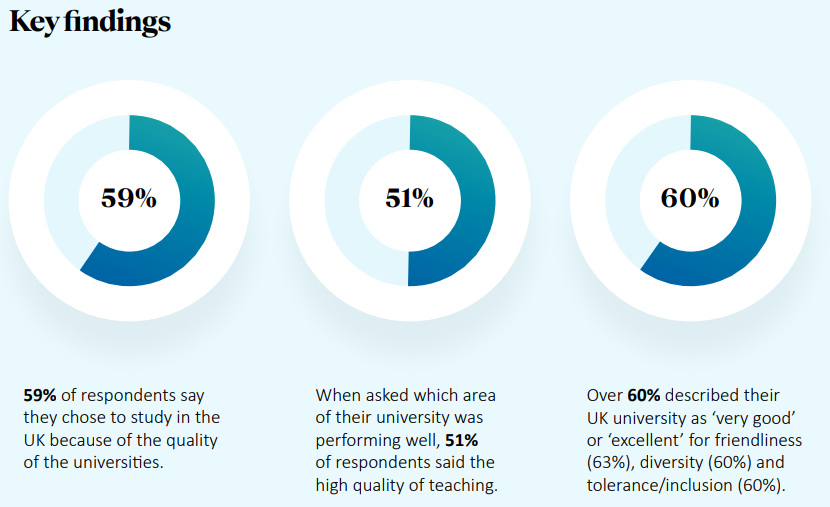
CANIE Accord recognised in QS World University Rankings: Sustainability
In our 2025 edition of our sustainability rankings, we listed CANIE as an officially recognised sustainability group for the first time. In turn, we encourage universities across the globe to consider the carbon impact of their international education mission and publicly commit to act specific initiatives within their universities to educate, advocate and act to create change.
We have also had a number of fascinating conversations with CANIE exploring the power of partnerships and how to revitalise the SDGs.
33% of Western European students said a Republican victory would significantly affect their choice to pursue education in the US
Using data from the QS Country Perception Survey, we saw that the outcome of the US election, which has since been won by Donald Trump and the Republican Party, would have significant impact on students’ decisions to study in the US.
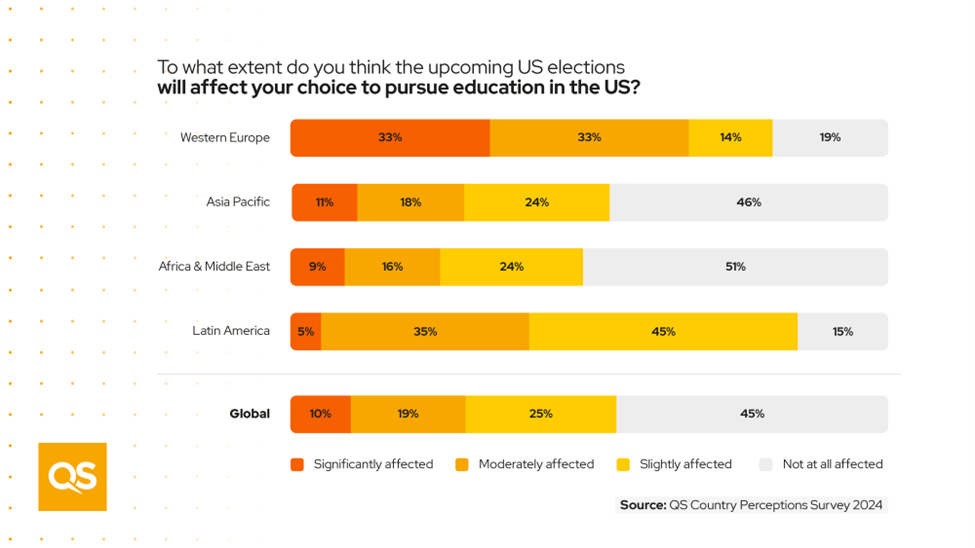
Offers for postgraduate study were down across UK universities, but post-92s and modern universities fared worse
For HEPI in May 2024, Matteo Quacquarelli, Vice President of Strategy and Analytics, looked at QS student enrolment data and found that offers for postgraduate study are down by 18% year on year, but deposits were only 2% down. However, the strong performance of the Russell Group was skewing the overall picture, and post-92 and other modern universities were experiencing more significant headwinds.
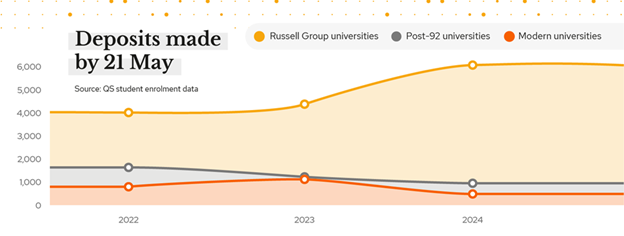
Later in the year and with international student recruitment over for 2024, we did another dive into our student enrolment to see if our trends continued.
“As of the end of September, overall demand is down year-on-year across our student enrolment partners,” we wrote.
Universities at the centre of economic growth strategies
The French higher education sector has a crucial role to play in driving economic growth. In our report, we identfied four areas that France should focus on to improve its economic landscape: re-skilling for the future workforce, attracting skilled labour to the country, boosting research innovation and a comprehensive plan for achieving ambitious recruitment goals.
In “All eyes on India,” we explored the impact India’s National Education Policy 2020 has been having on Indian higher education. As Dr Ashwin Fernandes said in his chapter, there are “multiple avenues for opportunities that India must grasp to realise the vision of Viksit Bharat@2047. All of them require collaboration and strong partnership to succeed:
- International universities opening branch campuses in India
- Strengthening industry-academia partnerships
- Exploring the importance of micro-credentials
- Empowering interdisciplinary research
- Pushing forward the agenda of social impact”
Debating the merits of human recruiters vs. AI
In QS Insights Magazine, Chloë Lane explored how universities are using AI chatbots to meet students’ desire for quick application responses. “AI chatbots can be a useful tool for students who are overwhelmed with the plethora of university or business school content available on their websites, brochures, social media and YouTube channels,” she wrote. But some institutions are wary of their risks. “Contrastingly, some higher education institutions have made a conscious decision to avoid AI chatbots,” Lane writes, citing Nyenrode Business University in the Netherlands.
We celebrated 20 years of QS Higher Ed Summit: Asia Pacific
In Macau, the three-day event explored shifting landscapes in the global higher education sector and looked for opportunities to forge collaborative solutions. One recurring topic at the Summit was education’s power and influence to do good – in a video address, former Secretary-General of the United Nations, Ban Ki-Moon called for action and outlined the role of education in achieving every one of the Sustainable Development Goals.
“Now is a critical time to advance quality education to achieve sustainable development, expand climate action, build peace and empower human rights,” he said. “In this regard, I firmly believe this is our moment to accelerate action and illuminate a dynamic future for all people and the planet.”
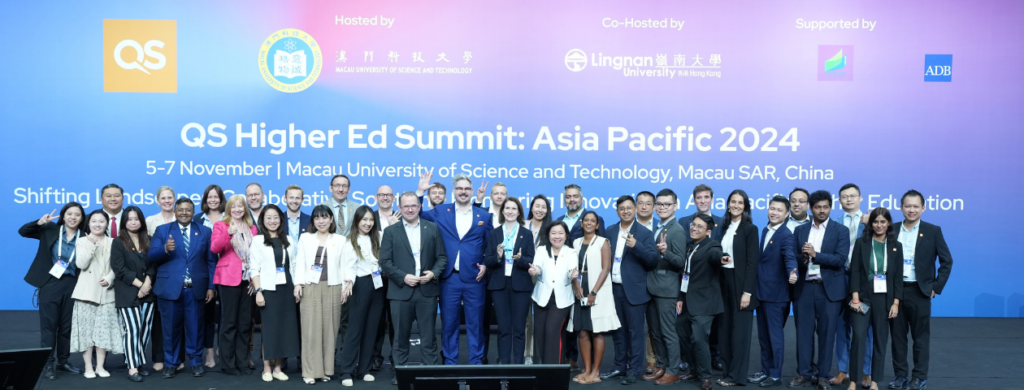
Subscribe for updates and get the latest QS insights delivered straight to your inbox.



